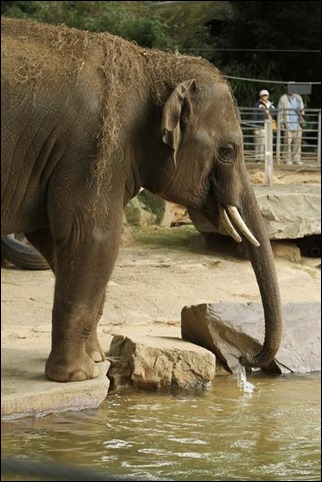 The Denver Post calls Billy the elephant a “pachyderm heartthrob”.
The Denver Post calls Billy the elephant a “pachyderm heartthrob”.
The 5-year-old Asian elephant arrived at the Denver Zoo on June 23rd on a flight from Amsterdam. It’s all part of an effort by what the Association of Zoos and Aquariums (AZA) calls its Species Survival Plan – an effort to infuse the aging and increasingly inbred U.S. zoo elephant population with genetic material from overseas.
Billy’s first job will be to father a new baby for the Denver Zoo’s collection. And his future almost certainly includes being shipped around the country on loan to other zoos as a stud to save their own elephant exhibits.
That’s because more and more elephants at zoos are suffering from serious ailments like heart disease, obesity, arthritis and infertility, and are now dying faster than replacements can be born. There’s even talk of zoo elephants needing to be classified as “endangered”.
Elephants, of course, are among the prime attractions at zoos. So it’s no surprise that zoos are racing to keep their populations from dwindling – and that rather than address the cause of the problem, they’re shipping more elephants from one zoo to another, and now even from around the world, as part of an emergency breeding program.
Latest case in point, then, is Billy, who was born in Ireland, then shipped to Belgium (where he was known as Bodi), and has now completed a 5,000-mile flight to Denver. The fact that the Denver Zoo and the AZA were prepared to swallow the enormous cost and the danger of flying an elephant so far speaks directly to the trouble they know they’re in.
According to the Denver Post:
Billy … will bring new blood and genes to the zoo as it continues its quest to become a leading house of bulls and key player globally in Asian elephant breeding and conservation.
But this newspaper is simply mouthing the propaganda of the zoo industry, rather than doing any serious reporting of its own. Zoos aren’t leading the way in conserving elephants globally. They can’t even conserve their own elephants.
Zoos aren’t leading the way in conserving elephants globally. They can’t even conserve their own elephants.
Billy will be living at the zoo’s $50-million Toyota Elephant Passage, a 10-acre exhibit that he’ll share with 49-year-old Dolly, 43-year-old Groucho, who was shipped there from Fort Worth, Texas, and 9-year-old Bodhi, from the Columbus, Ohio, zoo.
The Denver Post quotes the zoo’s VP of animal care as saying, “We’ve heard he’s a very charismatic boy. Our guests will love him..”
And this from assistant curator Becca McCloskey: “It’s been a long time in the making. He’s brand-new genetic material … He’s going to be fun to watch.”
In its press release about Billy, the Denver Zoo writes:
Denver Zoo is home to 3,800 animals representing more than 650 species and is accredited by the Association of Zoos and Aquariums (AZA). AZA accreditation assures the highest standards of animal care.
But the Denver Zoo has a highly questionable history with elephants. On his blog, Marc Bekoff, Professor Emeritus of Ecology and Evolutionary Biology at the University of Colorado, Boulder, writes of his experience several years ago:
In spring 2001, Asian elephants were regularly moved in and out of the Denver Zoo as if they were couches being moved from room to room. … Dolly, a 32-year-old female, was removed from her friends, Mimi and Candy, and sent to Missouri on her “honeymoon,” as the zoo called it, to breed. A few months later, Hope, a mature female, and Amigo, a 2½-year-old male (who had been taken from his mother), were sent to the Denver Zoo, where they lived next door to Mimi and Candy.
In the following months, Mimi got increasingly agitated. In June 2001, Mimi pushed Candy over, she couldn’t get up, and had to be euthanized (the zoo didn’t have a proper elephant hoist). Two days after Candy died, and a day after she was autopsied within smelling distance of the other elephants, Hope got angry, escaped from her keepers and rampaged through the zoo. Miraculously, no one was seriously injured. Hope was then transferred out of the zoo, and a new elephant, Rosie, was brought in.
… Playing “musical chairs” with animals who have no choice is serious business and can have dire consequences.
Very simply, elephants to not belong in zoos. And zoos are doing nothing of any value to “conserve” elephants, either in the wild, where their numbers are dropping catastrophically, or in captivity, where they are now recognized as equally endangered.